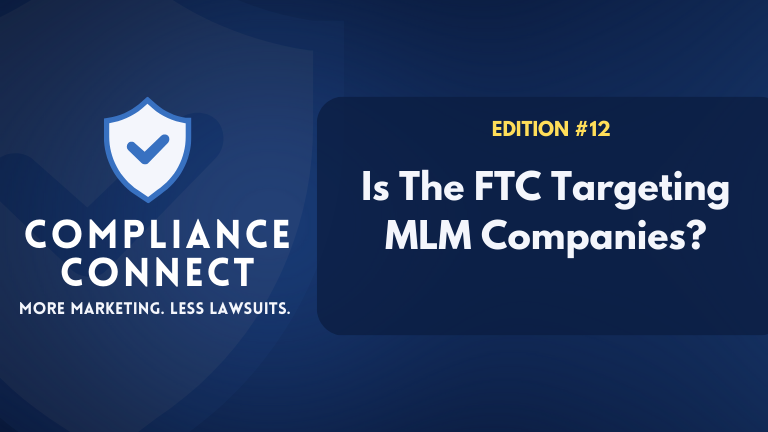Good morning! This is the twelfth edition of the Compliant Connect newsletter.
The goal is simple: to keep you in the loop on what the FTC and other regulatory agencies are up to so that you can protect yourself.
These newsletters will land in your inbox twice a week – Mondays and Thursdays.
Remember: this is NOT legal advice, only information!
Here’s the rundown today…
- 📱 New Jersey Sues TikTok
- 📞 Temu Accused Of Improperly Calling Prospects
- 💼 The FTC Looks At MLM Companies
- 🗽 Recent Change To New York Telemarketing Rules
- ✂️ Two Words You Should Remove From Your Marketing
Compliance Digest: What You Should Read Today
New Jersey Sues TikTok For “Abusive Practices” And “Deceptive Marketing”
New Jersey is suing TikTok for violating the state’s Consumer Fraud Act by allegedly using deceptive practices to make its platform addictive for children.
The lawsuit claims that TikTok’s design intentionally encourages compulsive use among youth, without fully informing them or their parents about the potential risks to mental health.
It also accuses TikTok of misrepresenting safety features, like the 60-minute time limit for minors, which is easily bypassed and doesn’t effectively limit screen time.
Additionally, TikTok allegedly fails to remove harmful content that violates its guidelines, further endangering young users.
Here is the full complaint.
Temu Sued For Sending Texts To People On The National Do Not Call Registry
The Chinese eCommerce giant Temu is facing a new class action lawsuit for allegedly sending marketing texts to individuals on the National Do Not Call Registry.
Note: If you sell anything over the phone, then you need to be aware of the rules around this!
The plaintiffs argue that Temu’s text advertising is intrusive and may cost recipients money, citing violations of the Telephone Consumer Protection Act.
Despite these claims, Temu asserts that it takes consumer protection seriously and plans to defend itself vigorously.
The company has faced multiple lawsuits over the past year, including multiple lawsuits around data privacy.

Is The FTC About To Target MLM Companies?
There’s a lot of smoke that the FTC is investigating MLM companies right now.
In April, the FTC updated its business guidance page for multi-level marketing (MLM) companies.
In September, the FTC reviewed the income disclosures from 70 MLM companies. They didn’t like what they saw.
Many of these statements emphasized the high earnings of a few customers while hiding the limited or nonexistent income of most participants.
These are NOT typical results of most customers.
This report is interesting because the FTC usually follows these up with enforcement actions.
There’s a good chance that right now the FTC is in the midst of investigating MLM companies. Here are some things we might expect, plus what non-MLM companies can take away…
What Are MLM’s?
Many of us have been prospected at one time or another by a family member or friend with promises of “being our own boss” and getting passive income from people “downline” from us.
This opportunity usually entails selling health products, information, kitchenware, lotions, potions, or even financial services.
Companies like Herbalife, Young living, Primerica, Amway, and thousands more promise to help you make money by selling the “top of the line” product in a niche.
But you don’t just sell the product; you RECRUIT a team under you and get to make residuals on their sales too.
The idea is that eventually you recruit so many people beneath you who are all selling this product that you make a bunch of “passive income.”
The FTC Has Targeted MLM’s Before
All the way back in 1979, the FTC took a close look at Amway – one of the first MLM success stories.
Amway was accused of being an illegal pyramid scheme.
The commission determined that Amway was NOT a pyramid scheme. It’s still around today.
However, the FTC did prohibit Amway from misrepresenting misrepresenting earnings as being typical results, among other business practices.
Recently, there have been massive settlements in the MLM world for earnings claims and other similar violations.
In 2012, BurnLounge settled for $17 million.
In 2014, Herbalife settled for $200 million.
In 2019, Advocare settled for $150 million.
The FTC’s Problem With MLM’s
Most of these cases revolve around misleading earnings claims. For example, Advocare was accused of relying heavily on implied earnings claims through its testimonials.
According to the FTC, Advocare customers were under the impression that they were likely to make a lot of money when, according to the FTC, the overwhelming majority didn’t make any money at all.
Even if Advocare didn’t come out and say “you will make a lot of money,” the FTC believed that Advocare’s marketing gave that impression.
In the Herbalife case, the FTC claimed that these implied earnings claims came in part from images of expensive homes, luxury automobiles and exotic vacations throughout the marketing materials.
According to the FTC’s latest report, the specific issues they noticed with earnings claims were…
- Not including participants with low or no earnings
- Not accounting for the expenses faced by participants
- These omissions are not disclosed
- The disclosures they did have were confusing
Lessons For All Businesses
If you own an MLM business you should be EXTREMELY careful right now. It’s clear the FTC is putting them under the microscope right now.
1. If the FTC publishes a report about a specific industry, then investigations are probably already happening.
2. Check your marketing for earnings claims – both EXPLICIT and IMPLICIT. If you can’t substantiate them as TYPICAL, then they have to go.
3. If you don’t have a system in place for establishing what a “typical” result is, then you should proactively create one.
For more information on how to establish a “typical” result, check out this episode of the Don’t Say That podcast.
Did You Know…
In New York, a new law in 2023 requires telemarketers to give customers the option to be added to the company’s do-not-call list at the beginning of telemarketing sales calls, right after providing the telemarketer’s name and the company’s name. Each violation can incur a fine of up to $11,000!

Quick Compliance Tip: Stop Saying “Hand Holding”
Have you come across this before?
“We’ll hold your hand the entire way.”
It’s a powerful sales message that’s NOT compliant most of the time.
The problem is that what CUSTOMERS believe hand-holding is usually different than what the company actually provides.
Some customers believe hand holding means getting step by step directions.
Other believe that it means that an expert is going to be looking over their shoulder, reviewing everything and giving immediate feedback that’s always going to work right away…
The NET IMPRESSION is that there’s nothing for them to do. They just have to show up and the results will be created by you and your “hand holding.”
So unless you’re letting your customer move into your house and be with you 24/7, there’s a good chance that some of your customers will feel misled.
“Hand-holding” is one of those terms that Greg asks clients to permanently remove.
It’s difficult to see how, even with context, you could use this term in an honest fashion.
Bottom line: Strike this term from your marketing. (Unless you do allow them to move into your house and be with you 24/7!)
